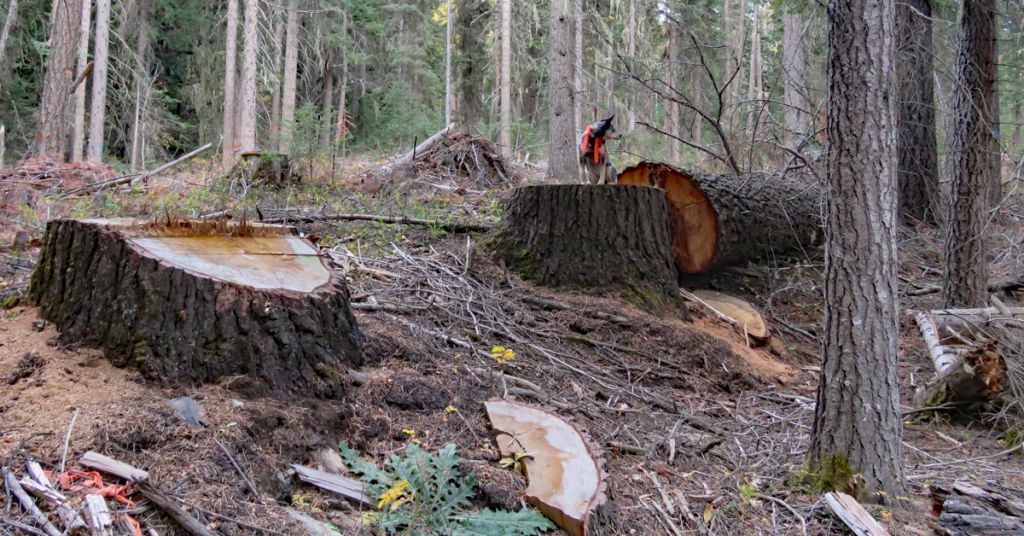By Dac Collins. May 23, 2019. Last year, a stand of poisoned ponderosa pines in the Deschutes National Forest drew attention to the risks of using chemical weed control methods. Now the Oregon Department of Agriculture has moved to restrict the use of the herbicide that state investigators blame for the die-off. The chemical known as ACP (aminocyclopyrachlor) is still approved at the federal level, however, and it remains to be seen whether or not the Environmental Protection Agency will change how it regulates the chemical.

One of over 1,000 pines that died after coming in contact with ACP. Photo courtesy of ODA
The ODA’s ruling, which went into effect on May 9, makes Oregon the first state in the country to seriously restrict the use of ACP. It prohibits the application of the herbicide on rights of way, natural areas, restoration areas and anywhere near a water source. It includes a number of exceptions, however, such as limiting the application of ACP to once every 365 days and using it only on state- or county-listed noxious weeds.
Originally manufactured by DuPont, Bayer CropScience acquired the chemical in 2014. It is still being marketed as a weed-killer, but according to the group Beyond Pesticides, which works to improve protections from pesticides and promote alternative pest management strategies: “ACP is a tree-killing pesticide masquerading as a broadleaf herbicide.” The group contends that the ODA should take its restriction one step further and ban ACP outright.
Drew Toher, Community Resource and Policy Director for Beyond Pesticides, says that “while Beyond Pesticides supports OAR603 as an important first step in the protection of Oregon’s natural areas, the legal, scientific and regulatory history surrounding aminocyclopyrachlor warrants the complete elimination of all allowed uses of this chemical by the ODA.”
Looking back on the chemical’s checkered history, it caught the attention of the Environmental Protection Agency soon after it was registered conditionally under the product name Imprelis. The EPA issued a Stop Sale, Use or Removal Order for Imprelis in August of 2011, after professional landscapers in the Midwest started noticing an unusual amount of dead conifers in areas where they sprayed the product.
DuPont eventually withdrew Imprelis from the market and paid nearly $2 million in civil fines to the EPA. But the chemical manufacturer continued to use ACP as the active ingredient in other herbicidal products, including one packaged and distributed under the name Perspective.
So between 2013 and 2015, when the Oregon Department of Transportation, the U.S. Forest Service and the Jefferson County Public Works Department repeatedly used Perspective to remove weeds on a scenic stretch of Highway 20, they were unaware of the deadly side-effects the product was having on nearby trees.
It wasn’t until later that they connected the dots, and a statewide investigation launched in January confirmed that ACP was to blame for the die-off. By that point, more than 1,000 ponderosa pines alongside the highway were either dead or dying.
“We just collectively dropped the ball on that, and it’s unfortunate,” Ian Reid, Sisters District Ranger for the Deschutes National Forest, told the Bend Bulletin last June.
During a public comment period that preceded the Forest Service’s decision to remove the dead trees, a number of citizens blamed the federal agency (along with ODOT and Jefferson County Public Works) for failing to heed the important precautions that are listed on the product label, which include:
“Injury or loss of desirable trees or vegetation may result if Perspective Herbicide is applied on or dear desirable trees or vegetation…”
“Certain species may, in particular, be sensitive to low levels of Perspective Herbicide but not limited to, conifers (such as Douglas fir, Norway spruce, ponderosa pine and white pine), deciduous trees…and ornamental shrubs.”
But regardless of what its label recommends, Toher believes that the product should never have been approved by the EPA in the first place. He says the whole situation is “indicative of of a broader flaw in the EPA registration process,” and explains that the agency “often approves the use of a chemical without all of the necessary data required to fully register the chemical, and will assign it a ‘conditional’ registration.”
“Time and time again, this process has shown to be dangerous,” Toher says.
“That is why we are very pleased to see that ODA did take action on this chemical, in a way acknowledging that the EPA did not do their due diligence in their initial permission to put this product on the market.”
The EPA has not made any indication that it will change the way it regulates ACP, but an EPA spokesperson says the agency “takes incidents of unintended plant damage very seriously, and will evaluate all available information, including incident data for Perspective, as part of the consideration(s) for any change to existing pesticide regulations.”










